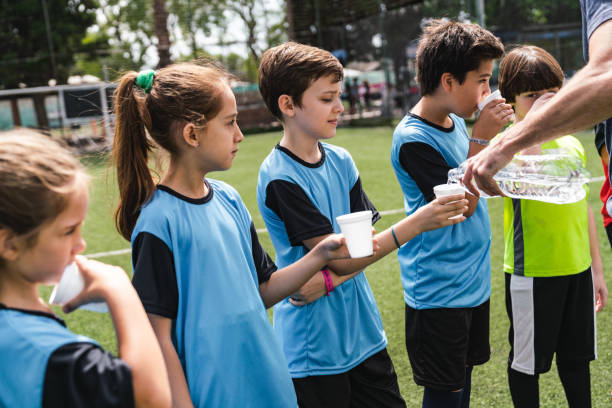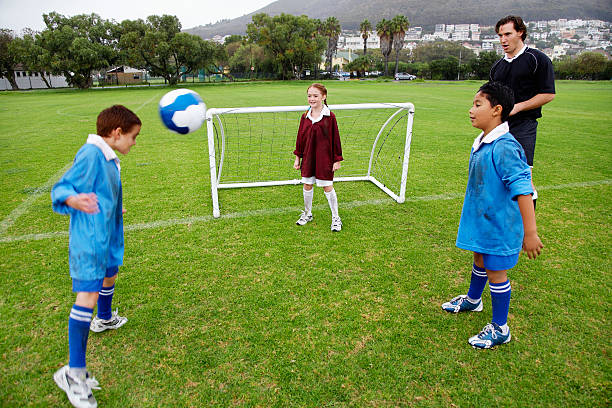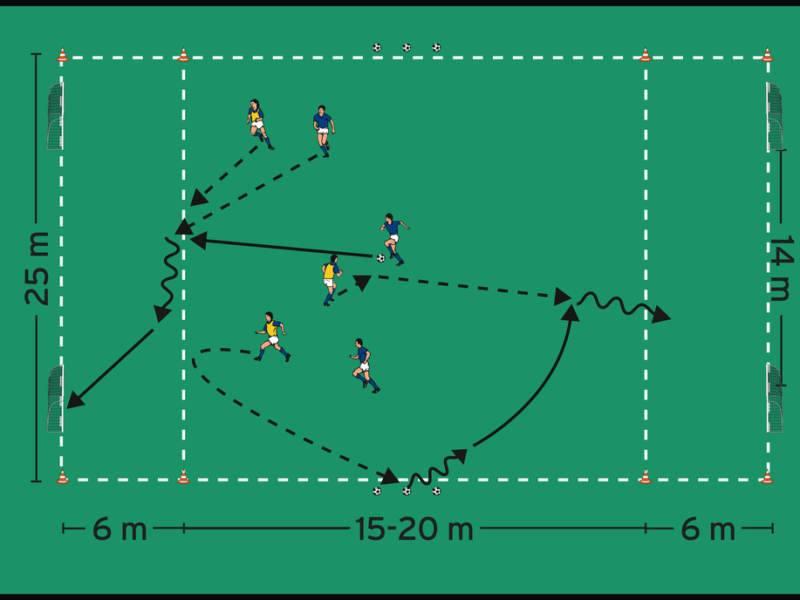As a parent or coach, you’ve probably asked yourself “How do I keep my soccer kids healthy?” It’s a valid and normal question.
With so many challenges facing kids today, maintaining health — especially for young soccer players can seem like a balancing act. Between practice, school and other activities, it’s easy for things like proper nutrition, hydration and rest to fall by the wayside.
But do not worry, there’s a framework we can follow that will help set your child up for success, both on and off the field.
When we talk about health, we’re talking about more than just avoiding injuries or eating the right foods. We’re talking about something more broader, which is wellness.
So, what exactly is wellness?
According to experts, wellness is the deliberate and continuous effort to stay healthy and achieve the highest possible level of well-being. It’s a conscious decision to adopt healthy behaviors that positively impact your quality of life and more importantly your longevity.
In this article, we’re focusing on physical health, the most familiar aspect of wellness. You want your young soccer player to have energy, strength, flexibility, and endurance, while avoiding injuries and burnout.
Here’s a breakdown of the 7 best ways to keep your soccer kids physically healthy and growing.
Fueling Their Bodies with Proper Nutrition
Let’s start with the basics: fuel.
Just like a car, your child needs the right fuel to perform at their best. And this doesn’t just mean a quick snack before practice — it’s about consistent, well-rounded nutrition throughout the day.
Here’s a simple guide:
Breakfast: It’s easy to skip this meal, but it’s the most important one for your young athlete. Whether it’s a full meal or just a quick bite, breakfast gives their bodies the fuel they need to start the day right.
Mid-Morning Snack: If your child has an early start, they’ll need a small snack to keep their energy up. A piece of fruit, yogurt, or granola bar can do the trick.
Lunch: Make sure their lunch covers all the food groups — a balanced meal of proteins, carbohydrates, and fruits or vegetables will keep them going through school and into afternoon activities.
After-School Snack: This is often forgotten, but it’s essential. If they’re going straight from school to practice, a PB&J sandwich, fruit, or smoothie will help ensure they don’t start practice on an empty stomach.
Post-Practice Meal: After all that running and sweating, they need to refuel. Protein (like chicken, fish, or beans) combined with healthy carbs (like rice, pasta, or potatoes) will help their bodies recover.
Pro Tip: Avoid fast food or processed snacks. They might be quick and easy, but they lack the essential nutrients your child needs to maintain energy and focus.
CHECK OUT | Fun Soccer Drills for 5-Year-Olds: The Ultimate Guide
Hydration, Hydration, Hydration

If you think about how much young athletes sweat during a game or practice, it’s clear why hydration is crucial. But here’s the thing: many kids don’t drink enough — and by the time they feel thirsty, they’re already dehydrated. Dehydration affects physical performance, mental sharpness, and recovery.
Water is Best: Encourage your child to drink water throughout the day, not just during or after practice. Being proactive about hydration can make a huge difference.
Electrolyte Replacements: For practices or games that last over an hour, especially in hot weather, electrolyte drinks can help replenish lost salts. Just make sure these don’t replace water entirely, and avoid sugary sports drinks as a habit.
Pre-Hydrate: Make sure they start drinking before they get thirsty. A small hydration deficit can negatively impact both physical performance and mental sharpness.
Pro Tip: Keep a reusable water bottle with them at all times to remind them to drink. The goal is to stay ahead of dehydration, not play catch-up.
Prioritizing Recovery
Here’s one of the most overlooked aspects of athletic training: recovery. It’s not just the practice or game that helps them get stronger, it’s what they do afterward that matters just as much.
Why Recovery is Key: When your child trains or plays, their muscles break down. It’s during rest and recovery that these muscles rebuild, becoming stronger and more resilient. Skipping recovery can lead to injuries, fatigue, and burnout.
Types of Recovery: This can be as simple as rest days between training sessions, proper sleep, and incorporating activities like stretching or light exercise (such as walking or swimming).
Pro Tip: Make recovery non-negotiable. It’s tempting for kids to want to practice every day, but they need time to recharge — both physically and mentally.
Stretching for Flexibility and Injury Prevention

Kids are naturally flexible, right? Not always.
Growing bodies often develop tight muscles, especially when they’re active and rapidly growing. Including a stretching routine into their training can make all the difference in preventing injury and improving performance.
Stretch Warm Muscles: After a practice or game, encourage your child to do some gentle stretching. This helps increase their range of motion, making movements smoother and more controlled.
Listen to Their Bodies: If something feels stiff, stretch it. If something is sore, stretch it gently. If something is painful, it’s time to rest and let it heal before stretching again.
Pro Tip: Stretching should never be rushed. A slow, sustained stretch is more effective than quick, jerky movements. Help your child focus on form, not just speed.
Prioritizing Sleep for Recovery and Performance

If you want to know the secret to peak performance, it’s simple: sleep.
And while it may sound like a no-brainer, getting enough sleep is often the hardest thing for kids to accomplish, especially as they juggle school, sports, and social lives.
At Least 8 Hours: Young athletes need a minimum of 8 hours of sleep every night, though 9-10 hours is ideal. This allows their bodies to fully recover from the physical and mental demands of their day.
Sleep vs. Everything Else: It can be hard to say no to extra activities, but sometimes skipping a late-night event or cutting back on screen time is what’s best for your child’s health and performance.
Tip: Help them with time management. They may want to do it all, but they cant and that’s okay. Sleep needs to be a priority, even if that means making tough choices about what gets left out.
CHECK OUT | Do College Soccer Players Earn Money For Playing?
Train Smart, Not Hard

You’ve probably heard the saying, “Work smarter, not harder.” The same goes for your soccer kid.
Overtraining is a real danger, especially for kids who are eager to improve or impress. The risk of injury is highest when they’re training too much without proper rest or guidance.
Age-Appropriate Training: Make sure your child is training in a way that’s suitable for their age and development. A well-trained coach will know how to structure practices that challenge them without pushing them too hard.
Injury Prevention: Before signing your child up for a team, ask the coach about their approach to keeping players healthy. Do they know what common injuries occur at this age? How do they plan to prevent and manage injuries?
Tip: Avoid pushing your child to do more than they can handle. Soccer is a demanding sport, and it’s important that they train within their limits.
Encourage Healthy Choices On and Off the Field
Finally, kids are still learning how to take care of their bodies, and it’s up to you to guide them toward making healthy choices. This doesn’t just mean telling them what to do but modeling good behaviors yourself.
Teach Them Self-Care: Help your child understand that their body is their most valuable piece of equipment. Encourage them to treat it with care — whether that means avoiding unhealthy foods, getting enough rest, or speaking up if they feel pain or discomfort.
Set Boundaries: Soccer kids often like to test themselves and push the limits. Make sure they know that taking care of their health is more important than playing through pain or exhaustion.
Tip: A coach with high behavioral expectations is key. Choose teams and environments where the focus is on long-term health and growth, not just winning.
Recap
Raising healthy soccer kids isn’t just about getting them to show up for practice. It’s about a holistic approach that considers all aspects of their well-being.
Fueling their bodies with proper nutrition, ensuring they stay hydrated, making time for recovery and sleep, training smart, and helping them make good choices, you’re setting them up for a lifetime of success — both on and off the field.



